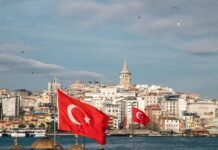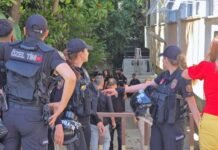
Turkish authorities are deporting or otherwise pressuring thousands of Syrians to leave the country to Tel Abyad, a remote Turkish-occupied district of northern Syria where humanitarian conditions are dire, Turkish Minute reported on Thursday, citing a statement by Human Rights Watch (HRW).
Turkey hosted nearly 3.1 million Syrian refugees who have fled civil war and were registered under temporary protection as of February 2024, according to official figures.
Refugees in Turkey are frequently targeted by Turkish politicians, who hold them responsible for the social and economic problems in the country.
HRW said between January and June 2023, the Tel Abyad border crossing administration published monthly or daily numbers of Syrian returnees on its Facebook page, labeling all as voluntary. An analysis of the page reveals an over twofold increase compared to the same period in 2022. While Turkey in the past maintained that all returns are voluntary, HRW research has found that Turkish forces have, since at least 2017, arrested, detained and summarily deported thousands of Syrian refugees, often coercing them into signing “voluntary” return forms and forcing them to cross into northern Syria. Turkish authorities did not respond to a letter HRW sent on February 1 sharing research findings and requesting information.
“Turkey’s ‘voluntary’ returns are often coerced returns to ‘safe zones’ that are pits of danger and despair,” said Adam Coogle, deputy Middle East and North Africa director at HRW. “Turkey’s pledge to create ‘safe zones’ rings hollow as Syrians find themselves forced to embark on perilous journeys to escape the inhumane conditions in Tel Abyad.”
HRW has seen border crossing statistics from Turkey into Syria provided by an informed source, revealing discrepancies with data published on the official Facebook pages of the three operational border crossing administrations in categorizing returns. The statistics provided reveal that between January and December 2023, Turkish authorities deported 57,519 Syrians and others over its border crossings, including 16,652 through the Tel Abyad crossing. Analysis of official page data show variations in reporting practices, with one crossing, Bab al-Hawa, distinguishing between returnees and deportees, which match the statistics shared with HRW, while the Bab al-Salama and Tel Abyad crossings do not.
According to the informed source, staff at all three border administrations interview every returnee and collect data, including on reason for return, but Turkish officials have successfully pressured the Bab al-Salama and Tel Abyad border administrations not to publish deportation numbers. This has left Bab al-Salama, since at least September 2022, categorizing all returns as simply “returns” and Tel Abyad, since at least January 2021, categorizing all returns as “voluntary.” Before September 2022, Bab al-Salama used to publish how many of the overall returns were voluntary. Tel Abyad stopped publishing data on returns in June 2023.
In 2023, Turkey increased the number of Syrians it sends back via Tel Abyad, which has been under the control of the Turkish-backed Syrian National Army since 2019. Turkey says it aims to turn areas of northern Syria under its control, including Tel Abyad, into “safe zones,” but in reality, these areas are rife with human rights abuses. Turkey’s incursion into the 150 kilometer-long strip of land between Raqqa and al-Hasakeh provinces displaced hundreds of thousands of people, forcing them to flee their homes.
In May 2022 Turkish President Recep Tayyip Erdoğan announced a plan to create a “safe zone” in the Turkish-occupied territories of northern Syria and build homes to accommodate up to 1 million Syrians living in Turkey. An HRW report published on February 29 documented serious human rights abuses and potential war crimes committed primarily by Turkey-backed local armed groups in these lawless and insecure areas. HRW also found that members of the Turkish Armed Forces and intelligence agencies were involved in carrying out and overseeing abuses.
HRW interviewed seven deportees sent to Tel Abyad, a human rights researcher, a border crossing official, the president of a local group in Tel Abyad hosting deportees and a journalist.
Six deportees said that they held a Turkish temporary protection ID permit when they lived in Turkey, which should protect Syrian refugees legally against forced return to Syria. Six said they were forced or coerced to sign “voluntary” return forms. All said they were from other regions of Syria and had no meaningful ties to Tel Abyad.
One said Turkish police detained him on the street in Antakya one month after his wife and three children were killed in the February 2023 earthquakes that devastated parts of southern Turkey and northern Syria. He said that the authorities detained him on his way to work even though he held a valid protection ID.
“They made me sign on documents written in Turkish, and I don’t speak Turkish,” he said. “They wouldn’t translate it. They are obliging us to sign these documents to make it look like voluntary returns.”
All seven deportees said Turkish authorities did not ask them their preferred border crossing for their return. Two said the deportations separated them from family members. “My wife and two kids are still in Istanbul, and I have no relatives and nowhere to go here and cannot bring them back to Syria,” said one man originally from Deir Ezzor. “I am trapped here.” As a party to the Convention on the Rights of the Child, Turkey is duty-bound not to separate children from their parents against their will except where competent authorities have determined that separation is necessary for the best interests of that child.
Since Tel Abyad came under Turkish occupation in 2019, it has had no operating crossing points to other parts of Syria, leaving expensive and dangerous smuggling routes the only viable option to leave the border strip. Four deportees said they had used smugglers to reach other non-government-held areas of northern Syria.
“I faced many hardships on my way,” said a 28-year-old deportee who was smuggled. “We were sure it was either we live, or we die. I left Tel Abyad at 8 a.m., and I arrived 30 hours later at my destination.”
One said he hoped to find a way to return to Turkey: “I am from Deir Ezzor, but I can’t go there. I don’t have anything left in Syria. I can’t go to my city at all.”
An aid worker whose organization provides temporary shelter to deportees in Tel Abyad said economic conditions in the region were poor. He said residents struggled to find jobs and that many had to rely on subsistence agriculture. Many deportees have been forced to rely on limited external assistance. “I try to survive on one meal per day here, if by any chance I was able to secure the expenses for it,” one said. “Most days, we sleep hungry.”
The aid worker said that his organization, the Al Bir Society for Social Services in Tel Abyad, hosts about 40 deportees a day and sheltered 1,500 total between June and December. “The organization’s capacity remains limited,” he said. He said the deportees sleep in dire conditions as there is not enough space. One 22-year-old deportee originally from Idlib said, “When there is no place left for us [at the organization], we sleep on the streets of Tel Abyad or in nearby mosques.”
The lack of access to other parts of Syria has compelled some deportees to turn to expensive and dangerous smuggling routes to escape the harsh conditions of Tel Abyad. Deportees who have had to use dangerous smuggling routes said that there is unofficial cooperation between smugglers and the Syrian National Army (SNA) and the Kurdish-led Syrian Democratic Forces (SDF), which control the borders of the enclave. They said it costs between $300 and $500 to be smuggled to another region in Syria, and more than $1,000 to be smuggled back to Turkey.
They said safety is a serious concern. “If someone is trying to leave through smugglers, one of the parties may arrest them on suspicion of being an agent or spy, which might land him in jail,” said the aid worker. Informed sources said Turkish authorities twice facilitated the transfer of Syrian deportees from Tel Abyad to Azaz, elsewhere in northern Syria, or back to Turkey in August 2023 after deportees complained about the situation in Tel Abyad. Human Rights Watch is unaware of any facilitated transfers since.
“I just want to be reunited with my family, and to be able to sustain a life for my kids and wife,” one deportee said. “This is impossible in Tel Abyad. We need to get out of here.”
UN agencies have organized three one-day humanitarian crossline missions to the Ras al-Ain and Tel Abyad areas since October 2022. The most recent mission in May 2023 was the first time UN agencies had reached Tel Abyad city since 2019. All three missions involved UN staff crossing to the area to directly provide limited humanitarian assistance and perform assessments of humanitarian needs.
However, the significant humanitarian needs remain largely unaddressed, according to humanitarian organizations, with Medecins Sans Frontieres (Doctors without Borders or MSF) calling the humanitarian situation there “alarming” in June 2023. The aid worker as well as several of the deportees interviewed said that they had not received any aid from Turkey or local authorities.
HRW said as the occupying power in Tel Abyad, Turkey has an obligation to maintain law and order and public life and protect Syrians there from violence, whatever the source.
“Turkey is bound by both its international humanitarian law and international human rights law obligations to ensure that its own officials and those under its command do not commit violations of international law, to investigate alleged violations, and ensure that those responsible are appropriately punished.”
Turkey is a party to the European Convention on Human Rights (ECHR), the International Covenant on Civil and Political Rights (ICCPR) and the 1951 Refugee Convention. As such, and as a matter of customary international law, it is obliged to respect the principle of non-refoulement, which forbids returning anyone to a location where they would face a real risk of persecution, torture or other cruel treatment, or a threat to their life. Turkish Law 6458 on Foreigners and International Protection (LFIP), issued in April 2013, offers Syrians “temporary protection in Turkey, ensures their non-refoulement, and guarantees their stay until safety is established in their original countries.”
“Deportees to Tel Abyad have painted a bleak picture of conditions in Turkey’s touted ‘safe zone,’ one where they are deprived of basic necessities, including shelter and sustenance, and forced to resort to perilous options to leave,” Coogle said.














